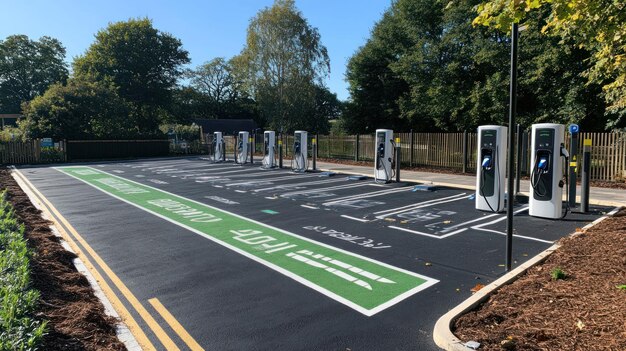FTC Probes Anti-Competitive Practices in EV Charging Market

The Federal Trade Commission (FTC) is investigating potential anti-competitive practices within the electric vehicle (EV) charging market. This investigation aims to determine if any companies are engaging in unfair methods of competition that could stifle innovation, limit consumer choice, or inflate prices in this rapidly growing sector.
The electric vehicle (EV) charging market is under scrutiny as the Federal Trade Commission investigates allegations of anti-competitive practices in the electric vehicle charging market. This probe could have significant implications for the future of EV infrastructure and consumer access to charging stations.
Federal Trade Commission Initiates Investigation
The Federal Trade Commission (FTC) has officially launched an investigation into potential anti-competitive behaviors within the burgeoning electric vehicle (EV) charging market. This inquiry is geared toward identifying any actions that might hinder competition and negatively impact consumers.
The FTC’s involvement underscores the increasing importance of the EV charging sector as it rapidly expands to meet the demands of a growing EV user base.
Scope of the Investigation
The investigation will likely encompass a broad range of potential anti-competitive practices, including but not limited to:
- Exclusionary contracts between charging network operators and property owners.
- Predatory pricing strategies aimed at undercutting smaller competitors.
- Manipulation of access to charging ports or charging speeds.
The FTC aims to ensure a level playing field for all participants, fostering innovation and consumer choice within the EV charging landscape.

This investigation could lead to significant changes in how EV charging networks operate and compete in the United States.
Concerns Over Market Consolidation
A key concern driving the FTC investigation is the potential for market consolidation within the EV charging industry. As larger players acquire smaller companies, there is a risk that competition could be stifled, leading to higher prices or reduced service quality for consumers.
The rapid growth of the EV market has attracted significant investment, but it has also created an environment where established companies can leverage their resources to dominate the market.
Impact on Smaller Competitors
Smaller EV charging companies often struggle to compete with larger, more established networks. This can lead to a decline in innovation and diversity of charging options for consumers. Some specific issues smaller companies may face include:
- Difficulty securing prime locations for charging stations.
- Limited access to capital for expansion and upgrades.
- Challenges in negotiating favorable terms with equipment manufacturers.
The FTC’s investigation seeks to address these imbalances and ensure that smaller competitors have a fair opportunity to thrive.
Potential Anti-Competitive Practices
The FTC’s investigation is likely to focus on specific practices that could be considered anti-competitive. These may include:
The FTC will be looking into potential abuses of market power.
Exclusionary Contracts
Some EV charging networks may enter into exclusive contracts with property owners, preventing other networks from installing charging stations at those locations. This can limit consumer choice and create geographic monopolies. For example, an operator might secure a long-term agreement with a shopping mall chain to be the exclusive provider of EV charging services at all of their locations.
Predatory Pricing
Predatory pricing occurs when a company sets prices below cost with the intention of driving competitors out of the market. This practice can be difficult to prove, but the FTC will be looking for evidence of companies intentionally undercutting their rivals to gain market share.
Data and Interoperability
The lack of interoperability between different charging networks can also create anti-competitive barriers. If consumers are forced to use multiple apps and accounts to access different charging stations, it can reduce the convenience and attractiveness of EVs. Increased standardization and data sharing could help address this issue.

The goal is to ensure a competitive market where consumers have access to a variety of charging options and fair prices.
Consumer Impact
The outcome of the FTC’s investigation could have significant implications for consumers. Anti-competitive practices can lead to higher prices, reduced service quality, and limited access to charging stations. A competitive market, on the other hand, can drive innovation and make EV ownership more attractive and affordable.
The FTC’s primary goal is to protect consumers from harm and ensure that they benefit from a competitive marketplace.
Benefits of a Competitive Market
A competitive EV charging market can offer several benefits to consumers:
- Lower prices due to increased competition.
- More convenient and accessible charging locations.
- Greater variety of charging options and services.
Ultimately, a healthy and competitive EV charging market is essential for the widespread adoption of electric vehicles.
Industry Response
The EV charging industry has responded to the FTC’s investigation with a mix of caution and cooperation. Many companies recognize the importance of addressing anti-competitive concerns and ensuring a level playing field for all participants.
Some stakeholders have voiced support for increased transparency and standardization within the industry.
Potential Regulatory Changes
The FTC’s investigation could lead to new regulations and guidelines for the EV charging industry. These changes could include:
- Requirements for greater transparency in pricing and contract terms.
- Rules to prevent exclusionary contracts and predatory pricing.
- Standards for data sharing and interoperability between charging networks.
Any regulatory changes will likely be aimed at promoting competition and protecting consumers.
Future of the EV Charging Market
The EV charging market is poised for continued growth in the coming years, driven by increasing EV sales and government incentives. However, the industry faces several challenges, including the need to expand charging infrastructure, improve charging speeds, and ensure equitable access to charging stations.
The FTC’s investigation will play a crucial role in shaping the future of the EV charging market and ensuring that it remains competitive and consumer-friendly.
Key Trends to Watch
Several key trends are shaping the EV charging market:
Keeping an eye on these topics will reveal a lot about the future of the industry.
- The rise of fast charging technology, which can significantly reduce charging times.
- The integration of renewable energy sources into charging stations.
- The development of smart charging solutions that optimize energy usage and reduce grid strain.
| Key Point | Brief Description |
|---|---|
| 🔍 FTC Investigation | Reviewing potential anti-competitive practices in the EV charging market. |
| 🤝 Market Consolidation | Concerns over larger companies acquiring smaller ones, limiting competition. |
| ⚡️ Consumer Impact | Anti-competitive practices can lead to higher prices and reduced service quality. |
| 📊 Industry Response | Industry acknowledges the importance of addressing anti-competitive concerns. |
Frequently Asked Questions
▼
The FTC is investigating to ensure fair competition, prevent monopolies, and protect consumers from potentially unfair pricing or reduced service quality in the rapidly growing EV charging sector.
▼
Potential practices include exclusionary contracts with property owners, predatory pricing strategies, and hindering interoperability between different charging networks, limiting consumer choice.
▼
The investigation aims to promote competition that benefits consumers through lower prices, increased accessibility to charging stations, and a greater variety of charging options.
▼
The investigation may lead to new regulations and guidelines to increase transparency, prevent exclusionary practices, and promote standardized data sharing within the EV charging industry.
▼
Key trends include the growth of fast charging, the integration of renewable energy, and the development of smart charging solutions to optimize energy usage and reduce grid strain.
Conclusion
The Federal Trade Commission’s investigation into the electric vehicle charging market is a critical step toward ensuring a competitive and consumer-friendly landscape. By addressing potential anti-competitive practices, the FTC aims to foster innovation, protect consumers, and promote the widespread adoption of electric vehicles.





